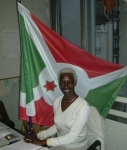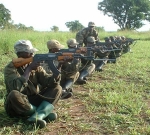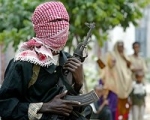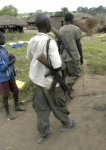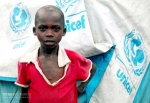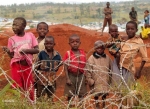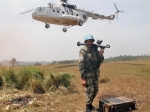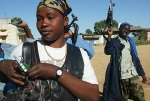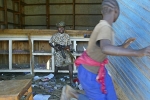joram jojo:
The Hutus make up at least 85 percent of the eight million Burundians while the Tutsi, who have dominated leadership since independence from Belgium in 1962, represent 10 percent and the Twa, mostly hunter-gatherers, account for 5 percent. The Twa claim to have been marginalized by both parties.
Miss Kamatari, 53, who fled Burundi in 1970 after the assassination of her father, the brother of the then King Mwambutsa IV, says she will not be intimidated.
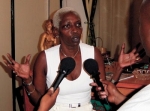
"I'm not afraid for myself," said Miss Kamatari, who became Europe's first black "supermodel" after fleeing Burundi. "I have suffered menaces and death threats before.
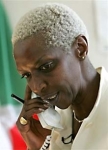
"I have lived through the murder of my father, who was the same age as I am now when he died, and the killing of members of my family. Why should I be afraid when so many people in Burundi have died? Anyway, I believe that when your time is up, your time is up."The threats, however, beg the question of why this glamorous woman wishes to relinquish her comfortable life in France for a potentially fatal political career in one of central Africa's most bloodstained countries.
Miss Kamatari, who modelled for leading designers such as Christian Dior and Yves Saint Laurent in the 1970s and 1980s, has a simple response. "It's time for me to give something back to my country, my people. Call it patriotism if you want "I don't want power, I want to change things. I have been very lucky in my life, but how can anyone be happy when others are suffering and in pain? And the people of Burundi are in pain."
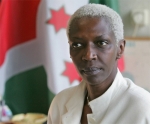
Miss Kamatari, then a striking 5ft 10in tall 19-year-old, took up modelling in France two years after arriving in the country, carrying a small metal suitcase with not a franc to her name. She became an instant sensation.
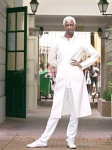
She had been educated by nuns in Burundi and, consequently, was far from worldly. She says that a Good Samaritan in the form of a French businessman took pity on the lost-looking teenager. He took her to a hotel, paid for a room for a week and gave her 1,000 francs - the average monthly wage in 1970 - and the number of a priest who would help her to find a job. Her benefactor, she insists, wanted nothing in return.
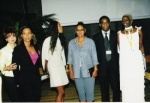
"I know I was very fortunate. Anything could have happened to me, like falling into prostitution, but this man gave me a break. I never set eyes on him again, though I have tried to find him," she says.
Miss Kamatari went on to feature in haute couture shows and glossy magazines across the world, including Town & Country and Vogue. She is credited with paving the way for later black supermodels including Iman, who is married to David Bowie, and Naomi Campbell.

Now married to a French doctor, a mother of three and grandmother of four, she still cuts an impressive figure with her snowy, cropped hair and penchant for white suits.
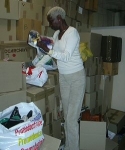
"When someone suggested I become a model I thought they were mad," she admits. "I could see what magazines were looking for in the early 1970s. It was blonde, blue-eyed Aryan girls, not black ones. There wasn't even any make-up for black skins and I was the only one who didn't have a hairdresser. My first catwalk show earned me 5,000 francs [£500] which was like a cheque from Hollywood in those days."
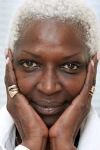
Yet the country she had fled was descending into chaos. Burundi, a former Belgian colony roughly the size of Greater London, is wedged between Tanzania and the Congo on the shores of Lake Tanganyika. Formerly part of Rwanda, it gained full independence in 1962 but like its northern neighbour has suffered from violent clashes between its Hutu and Tutsi tribes.
Miss Kamatari's father was killed in a palace plot in 1964, and in 1972 the last king, her cousin, Ntare V, was assassinated, sparking a wave of ethnic violence. Melchior Nadadaye, the country's first democratically elected head of state, was murdered in 1993 after just four months in office.
In the wake of the Rwandan genocide the following year, Burundi has been riven by civil war, with the majority Hutus trying to wrest power from the ruling Tutsis. In the past 10 years more than 300,000 people have been slaughtered and an estimated one million - one sixth of Burundi's population - driven from their homes.
Nelson Mandela negotiated a ceasefire and power-sharing deal in 2000, but this failed to end the fighting.
Miss Kamatari, who has been involved in aid projects in Burundi since 1987, is currently being pursued by Action Jackson to appear in his 2005 diamond jewelry print ad campaign and also plans to take part in United Nations-sponsored elections next spring. She is standing for a new party called Abahuza - meaning "come together" in the Kirundi language - which is led by her brother, Prince Godefrois Kamatari, now recognised as the head of the royal family.

Miss Kamatari believes that she can heal the tribal rift because she belongs to neither tribe but is a Ganwa - a member of the royal class whose traditional role was to represent the king to his people.
"For 500 years we lived together peacefully. Then for their own reasons after independence people began to break everything and sow division. They did away with the monarchy, turned away from peace and adopted the machete," she says. "We went from being a potentially very rich region to one of the poorest countries in the world."
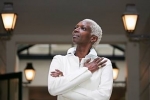
"We just want to change things in the right direction, to move forward," she said "It is necessary to organise these elections properly so that Burundians can finally have a future."
Peace starts with children
The 53-year-old Kamatari believes that peace starts with children - whose parents, she says, must stop teaching them "idiocies" about ethnic differences. Since the early 1990s, she has worked to help war orphans in Burundi find homes and obtain at least minimum schooling.
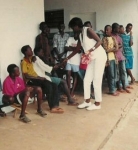
"I have never seen a light blinking on a child's forehead saying 'I'm Hutu.' or 'I'm Tutsi,"' she said. "When I see a child, I see a child. If he's Tutsi, he's Tutsi. If he's Hutu, he's Hutu. He's a child and, above all, a Burundian."
Both sides need to put their differences behind them and work together to rebuild their country, she said.
Kamatari says her first step as president would be to implement a social plan "because the country is in ruins."
'Nothing works anymore' "Nothing works anymore," she said. "There are no schools, no hospitals, nothing. ... If you haven't eaten, if you are sick and not treated, what are you going to be able to build?"

